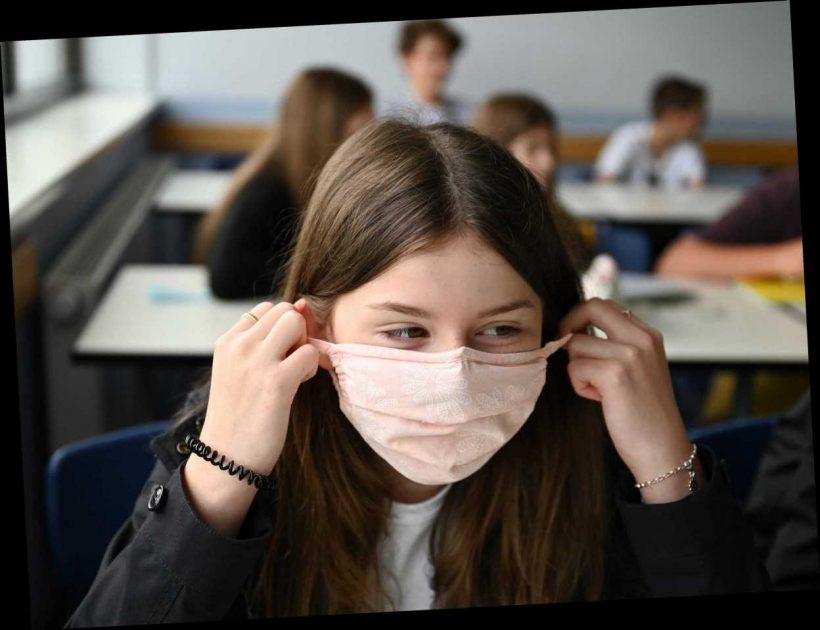GAVIN Williamson says the March 8 reopening of schools will "mark a moment of joy for millions" after months of home-learning.
New advice applies to the use of face coverings by staff, pupils and
students in schools and further education across England.
Do children have to wear face masks at school?
Children in primary schools do not need to wear a face covering upon returning to classrooms on Monday, March 8 2021.
However kids in year 7 and above have been advised to wear face coverings in classrooms and during activities unless social distancing can be maintained.
Students in year 7 and above are also 'recommended' to don face
coverings when moving around their school, outside classrooms, such as in corridors and in communal areas where social distancing cannot easily be maintained.
But face coverings do not need to be worn by pupils when they're outdoors at school.
And the government says in its revised guidance for the March 8 reopening that year 7 and above students don't need to don face coverings when taking part in exercise or strenuous activity, for example PE lessons.
The Department for Education (DfE) says these "additional precautionary measures" are in place "for a limited time during this period of high coronavirus prevalence in the community".
The face covering rules are in place until Easter, when they'll be reviewed in light of updated coronavirus infection stats.
You can buy reusable or single-use face coverings.
Kids may also use a scarf, bandana, religious garment or hand-made cloth covering – but these must securely fit round the side of the face.
Face coverings are largely worn to protect others – not the wearer – against the spread of infection because they cover the nose and mouth, which are the main confirmed sources of transmission of the coronavirus.
Some schools are insisting kids wear branded masks, reports The Times.
Do teachers have to wear face masks at school?
In primary schools, the DfE recommends that face coverings should be worn by staff and adult visitors where "social distancing between adults is not possible" – for example, when moving around in corridors and communal areas.
Where pupils in year 7 and above are educated, it recommends that face coverings should be worn by adults (school staff) and pupils when moving around the premises, outside of classrooms, such as in corridors and communal areas where social distancing cannot easily be maintained.
The DfE now also recommends that face coverings should be worn in year 7 and above classrooms or during activities unless social distancing can be maintained.
This doesn't apply during strenuous activity, such as PE lessons.
Who is exempt from wearing a face mask?
Those who rely on visual signals for communication, or communicate with or provide support to such pupils, are currently exempt from any requirement to wear face coverings in education settings or in public places.
People who cannot put on, wear or remove a face covering because of a physical impairment or disability, illness or mental health difficulties are also exempt from donning masks.
Transparent face coverings, which may help communication with someone who relies on lip reading, clear sound or facial expression to communicate, can be worn if needed.
Otherwise, however, face visors or shields should not be worn as an alternative to face coverings.
"They may protect against droplet spread in specific circumstances but are unlikely to be effective in preventing aerosol transmission when used without an additional face covering," says the DfE.
What other rules will be in place at schools?
Primary school children, secondary school pupils and college students as well as university students on practical courses who need access to specialist facilities and equipment will all return on Monday March 8.
All secondary school and college students will take three Covid tests as they return to the classroom, at existing school testing facilities.
Schools and colleges will have discretion on how to stagger the return of their students over that week to allow them to be tested on return.
After an initial programme of three tests in school or college, students will be provided with two rapid tests to use each week at home.
"We know the lateral flow tests find the people who are most infectious and therefore the most likely to transmit to others.
"We know that using these tests is a way of finding those asymptomatic people rapidly as the results come back in 30 minutes," said Dr Susan Hopkins, deputy director of Public Health England.
Schools will provide hand sanitiser for staff and children to use when they reopen.
Schools will have to ensure that sufficient hand-washing facilities are available, where a sink is not nearby, provide hand sanitiser in classrooms and other learning environments.
Teachers, other staff and pupils will have to frequently wash their hands with soap and water for 20 seconds and dry them thoroughly.
Public Health England has said that taking the temperature of pupils is an unreliable method for identifying coronavirus.
Source: Read Full Article





